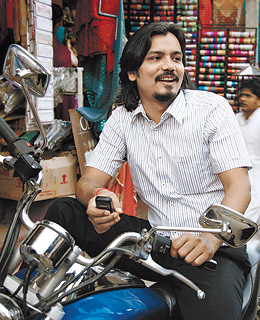
When Sourabh Jain set out to build a mobile-commerce platform in 2004, he aimed high. "I knew I wanted to build a disruptive technology ... the Google or Amazon of m-commerce," says the Delhi College of Engineering grad. Four years later, his start-up, ngpay, is India's largest "mall on the mobile." More than 225,000 users shop, book train tickets, pay bills and bank using even entry-level handsets over any secure network. Only eight months old, ngpay hosts 1.6 million transactions a month and is India's fastest-growing m-commerce business.
Jain quit his job at Lucent Technologies to start JiGrahak from his Bangalore apartment with a team of three techies. It was kept afloat with contributions from friends and family. With characteristic chutzpah, Jain took two key risks. First, he built a platform not simply for m-payments but for m-commerce — a bigger, more complex challenge. Second, at a time when no one seemed to grasp high-speed data networks' potential, his team perfected a platform, ngpay, that was cheap and quick to download and use, and several notches up from existing m-commerce options. Its one-stop mobile-shop model enabled easy browsing of hundreds of neatly categorized services and products.
Despite having a pathbreaking technology, Jain found it an uphill battle to take ngpay to market and persuade businesses to sell their wares or services over it. "His initial meetings were spent explaining just how the mobile could be used for something other than making voice calls," says Abhijit Bose, ngpay's vice president, with a laugh. The company now offers 250 products and services. Bose says ngpay has shown that m-commerce is a viable and scalable alternative to e-commerce. It has enormous potential in India, where there are only 15 million PC Internet connections but 65 million mobile Internet users. "Over 70% of our users are outside the metros," Bose says. "We can lead the way in providing low- cost m-commerce and financial services to the underserved."